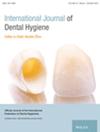Brazilian undergraduates' and dentists' knowledge on preventing, diagnosing and managing dentin hypersensitivity: A cross-sectional questionnaire study
Abstract
Objectives
To analyse the knowledge of dental undergraduates and dentists on the prevention, diagnosis and management of dentin hypersensitivity (DH); to compare their knowledge scores; and to understand the related variables using a regression model.
Methods
An original online questionnaire investigated the attitudes, self-reported knowledge (‘how much they thought they knew’) and real knowledge (‘how much they really knew’) of 132 students and 338 dentists. Data were analysed descriptively, both knowledge scores were compared using Mann–Whitney and Wilcoxon signed-rank tests and data were subjected to two multiple linear regression analyses considering real knowledge scores as the dependent variable (α < 0.05).
Results
The self-reported knowledge on DH was higher than the real knowledge for both students and dentists, but dentists presented the highest scores. Gingival recession and acidic diet were reported as the main predisposing factors for DH by undergraduates and dentists. Students normally managed DH with dietary and hygiene instructions followed by a desensitizing agent application, while dentists managed with occlusal adjustments. The mechanism of glutaraldehyde/HEMA and bioactive fillers on DH is widely unknown by students and dentists. The majority of the questioned individuals cannot differentiate DH from sensitivity of caries or molar-incisor hypomineralization.
Conclusion
Both students and dentists overestimate their knowledge of DH, revealing deficiencies in prevention, diagnosis and management. Students' knowledge improves towards the end of the Dentistry course, while younger dentists and PhD holders are more knowledgeable. Institutions should implement ongoing DH education for undergraduates and conduct interventions for experienced professionals, especially older ones.

 求助内容:
求助内容: 应助结果提醒方式:
应助结果提醒方式:


